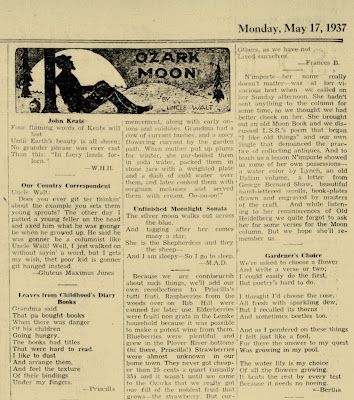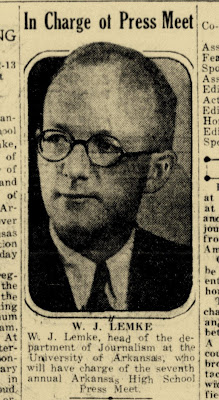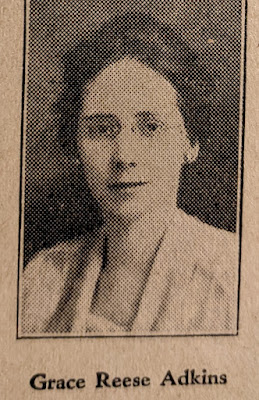Mrs. Adkins's father, Edwin Frank Reese (1852–1924), was a stonemason but had interests far beyond his work. In her poems, Mrs. Adkins tells us about his love of books, providing some insight into her own bookish nature. She also lets us know that her pa played the fiddle, and she sometimes accompanied him on the organ. From the poems, we learn that Grace's pa at times got exasperated with the kids underfoot and could be a bit absent-minded.
 |
| "Ozark Moon," Fayetteville Daily Democrat," May 17, 1937, p.2 |
That pa bought books
When there was danger of his children
Going hungry.
The books had titles
That were hard to read.
I like to dust
And arrange them.
And feel the texture
Of their bindings
Under my fingers.
Mrs. Adkins inherited her father’s love of books. I learned
that when I was about eleven years old in 1958 and went for the first time to a
Bible study class that Mrs. Adkins conducted in her home next to the Christ’s
Church building on Rock Street in Fayetteville. I was astounded by the library/study
where we assembled. The walls were lined with stuffed bookshelves and every
flat surface in the room had piles of magazines, clippings, and newspapers. I
had never seen such a room; my parents and relatives we often visited had no such
bookshelves because they kept few books other than the Bible and those with
recipes.
Mrs. Adkins's parents grew up in Pennsylvania, but got married in Buffalo County, Wisconsin on September 20, 1879. They must have made many good friends in Mondovi. In one poem, we learn from Mrs. Adkins that friends who played the fiddle sometimes congregated in his home for an evening and her father joined them playing the instrument.
Folks used to come
And spend the evening
With us –
Particularly folks
Who played the fiddle,
I often seconded
On the organ.
Pa’s fingers were stiff
From laying rock,
But mother liked
To have him play
As he used to do
Before they were married.
When the younger children
Got in the way of his arm,
He scowled
And tapped them on the head
With this fiddle bow
The pieces had queer names
Like Irish Washerwoman,
The Devils’ Dream,
And Sailor’s Joy.
Mrs. Adkins not only inherited a love of books and reading from her pa, but also must have acquired her love of music from him. She learned during her childhood how to play the organ and piano, and after she moved to Arkansas, she often composed music and wrote songs. During her life, she produced six songs that appeared in one or more of ten hymnals, the first published in 1914 and the last in 2011. One of her songs, “I’ll Wish I Had Given Him More,” is still sung. The most popular version of it is sung in an expansive Dutch cathedral, and it features soprano Maria Kemler backed by the huge Waddinxveen (Netherlands) men’s choir and accompanied by an ornate organ. As of February 2022, nearly 400,000 viewers had watched that performance, which can be viewed at this link: https://www.youtube.com/watch?v=420nDNYoAx0
Once a week, Mrs. Adkins’ pa would shave, likely using a straight razor that would punish his face if he didn’t pay close attention to what he was doing.
 |
| Walter Lemke, Fayetteville Daily Democrat, April 9, 1935, p. 6. |
Pa shaved
On Sunday morning,
While we children
Dodged around
Under his elbow.
It made him cross
And nervous,
And when he cut himself,
Anything could happen.
Sometimes he only set us in a corner
Till we quieted down.
Lemke, the column editor, commented on this poem: “This leaf from Priscilla’s childhood diary calls attention to one of the most significant contrasts between then and now. Pa was the big boss. The razor strop was put to other uses than honing the razor. [Yikes] Imagine pa trying to get into the bathroom to shave on a Sunday morning nowadays. Why there wouldn’t even be room for his old shaving mug among the creams, lotions, and other preparations that decorate the bathroom of today.”
Lemke’s reference to “Priscilla’s childhood diary” reminds me that I have failed to mention that Mrs. Adkins’s poems in Ozark Moon were published under a pseudonym. In fact, almost all poems in Lemke's column were signed with either pseudonyms or initials. Hers was Priscilla, a name drawn from the Bible. Even Lemke used a pseudonym, calling himself "Uncle Walt."
One of Mrs. Adkins’ memories of her father was the time he absentmindedly stole a dinner napkin from a preacher’s house. It was probably a family joke for the years that followed.
Pa liked to visit
With preachers;
And after he
Had dined
With the Congregationalist minister
Ma found
A dinner napkin
In his pocket.
Uncle Walt offered his irreverent comment on this poem: “And of course pa said, ‘Now how
do you suppose that got there?’” You didn’t have any Pullman towels or
Delmonico silver around your house, did you Priscilla? And another thing – what
was ma looking for in pa’s pocket.”
Priscilla may have been amused by Lemke’s comments, but she was not known for her sense of humor.



